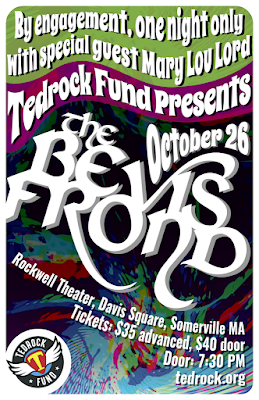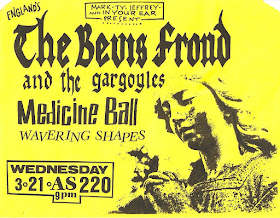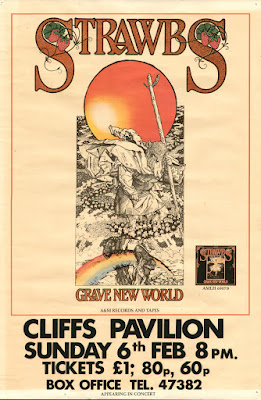The Fleshtones were formed in 1976 in Whitestone, New York by Keith Streng (born September 18, 1955, New York, New York) and Jan Marek Pakulski (born August 23, 1956, Lewiston, Maine), two roommates who discovered that a previous tenant had left behind some instruments in the basement of the house they were renting. Streng, on guitar, and Pakulski, on bass, were soon joined by neighborhood friends Peter Zaremba (born September 16, 1954), Queens, New York) on harmonica, keyboards, and vocals, and Lenny Calderon (born 1958), New York City) on drums.
In 1980, with the Red Star Records album not released (but later issued on cassette on ROIR, and subsequently on CD and vinyl), the Fleshtones were signed by Miles Copeland III at I.R.S. Records, where they worked with producers Richard Mazda and Richard Gottehrer.
Roman Gods is the first album by The Fleshtones. Trouser Press called it a "big leap forward" from the band's debut EP, Up-Front, noting that its adds "new personality and passion to the beat". The album was largely recorded at Skyline Studios in New York City in June 1981, with the exception of one track ("The World Has Changed"), which was recorded at RKO Studios in London in February 1981, and produced by Richard Mazda. The record sleeve was designed by lead singer Peter Zaremba. The song Shadow-line (to J. Conrad) was performed by The Fleshtones in the concert film Urgh! A Music War.
[ AllMusic Review by Mark Deming
In the 1980s, of the dozens of bands who were mining the sounds of '60s garage rock for inspiration, few were smarter or wittier about it than the Fleshtones; lots of folks might have sounded more like the Knaves or the Remains or whatever band they chose to embrace as a sonic template, but Peter Zaremba, Keith Streng, and their partners in Super Rock were able to communicate heart, soul, and actual thought instead of a mere awestruck nostalgia.
The Fleshtones could also rock pretty hard, and were willing to mix up their influences a bit (not many nuevo garage bands would pick Lee Dorsey as the source of their album's sole cover tune). There's never been a real substitute for seeing the Fleshtones live (not even their live album quite fills
the quota), but Roman Gods does a fine job of getting their ideas down on plastic with muscle, enthusiasm, and creative thinking, and it boasts several of their best songs, including the hard-charging "R-I-G-H-T-S," the moody "Shadow Line," the rollicking "I've Gotta Change My Life" (good advice!), and the title cut, easily the finest Kingsmen tune ever written by some guys from New York 20 years after "Louie Louie" was a hit. It's cool, it's not dumb, and it sounds great at a party -- Roman Gods is everything you've ever wanted in a garage revival album, and more!]
It was at this time that the band replaced Calderon with drummer Bill Milhizer (born September 21, 1948, Troy, New York), and appeared in the British punk/new wave film Urgh! A Music War, and released its first EP Up-Front. Four albums on I.R.S. followed: Roman Gods (1982), Hexbreaker!! (1983), and the live Speed Connection and Speed Connection II (1985). In 1982, they appeared on Dick Clark's American Bandstand TV show. In 1984 they re-recorded "American Beat" as part of the soundtrack of the Tom Hanks's movie Bachelor Party.
Despite having a large cult following, the band never achieved commercial success: Roman Gods debuted at No. 174 on Billboard’s album chart, the highest position that a Fleshtones album has attained.
The Fleshtones played at a CBGB 30th Anniversary show along with The Dictators in December 2003, and in August 2004 played Little Steven's Underground Garage Festival at Randalls Island in New York City with 39 other bands, including The New York Dolls, Iggy Pop, The Strokes, and Bo Diddley.
The Fleshtones signed with Yep Roc Records in 2003, which has released the albums Do You Swing? (2003), Beachhead (2005), Take A Good Look (2008), Stocking Stuffer (2008), Brooklyn Sound Solution (2011), Wheel Of Talent (2014), and The Band Drinks For Free (2016), as well as the EP Quatro X Quatro (2012), the compilation Budget Buster (2017), and several singles.
In September 2016, the Fleshtones toured China for the first time in the band's career. The tour was organized by Shanghai-based punk band Round Eye.
TRACKS
01. The Dreg (Fleshtone-77) - Keith Streng, Peter Zaremba 3:17
02. I've Gotta Change My Life - Keith Streng, Peter Zaremba 2:32
03. Stop Fooling Around! - Peter Zaremba 4:06
04. Hope Come Back - Keith Streng, Peter Zaremba 2:25
05. The World Has Changed - Keith Streng, Peter Zaremba 3:10
06. R-I-G-H-T-S - Keith Streng, Peter Zaremba 2:32
07. Let's See the Sun - Peter Zaremba 2:40
08. Shadow-line (to J. Conrad) - Keith Streng, Peter Zaremba 3:13
09. Chinese Kitchen - Keith Streng, Gordon Spaeth 2:12
10. Ride Your Pony - N. Neville 3:21
11. Roman Gods - The Fleshtones 4:40
The Fleshtones
Bill Milhizer – drums
Jan Marek Pakulski – bass guitar
Keith Streng – guitar
Gordon Spaeth – alto saxophone, harmonica, art direction
Peter Zaremba – vocals, illustrations, design
John Weiss – tenor saxophone































































